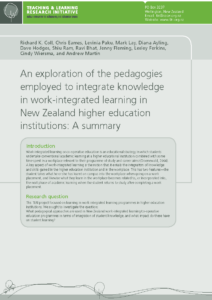Introduction
Work-integrated learning or co-operative education is an educational strategy in which students undertake conventional academic learning at a higher educational institution combined with some time spent in a workplace relevant to their programme of study and career aims (Groenewald, 2004). A key aspect of work-integrated learning is the notion that it entails the integration of knowledge and skills gained in the higher education institution and in the workplace. This has two features—the student takes what he or she has learnt on campus into the workplace when going on a work placement, and likewise what they learn in the workplace becomes related to, or incorporated into, the next phase of academic learning when the student returns to study after completing a work placement.
Research question
This TLRI project focused on learning in work-integrated learning programmes in higher education institutions. We sought to investigate the question:
What pedagogical approaches are used in New Zealand work-integrated learning/co-operative education programmes in terms of integration of student knowledge, and what impact do these have on student learning?
Research design
This one-year study employed a collective case study methodology across three important areas of higher education in New Zealand: science and engineering; business and management; and sport. Students, employers, and work-integrated-learning practitioners/facilitators from higher education institutions across all three sectors participated in semi-structured interviews that involved discussion of current pedagogical strategies used to facilitate student learning on campus and in the workplace, and the integration of on- and off-campus learning. Another important data source was document analysis of relevant documentation (for example, paper/course outlines, student guidelines, etc.), which was used to triangulate the interview findings. In the final phase of the research, the work-integrated learning practitioners, advisers, and the senior researchers met face-to-face to discuss the findings of the collective case studies, and synthesise general conclusions.
Research findings
An overview of the research findings across all three sectors points to some differences, but remarkable commonality across the sectors. There seems to be strong consensus across all three sectors, and for each cohort of stakeholders, that all three parties (students, employers, and work-integrated-learning facilitators) benefit from work-integrated learning, with most benefit accruing to students, who are seen to gain important graduate competencies/skills and career enhancement. Students are thought to pick up a repertoire of skills from work-integrated learning, mostly as a result of completing a placement, practicum, or industry-based learning project.
On-campus pedagogies consist of lectures, tutorials, and (for the science and engineering, outdoor education, and some of the business and management students) practical work. The main purpose of such pedagogies is to provide basic content knowledge and theory, with learning about practical, real-world work anticipated from the off-campus work placement, practicum, or project. Most programmes, irrespective of the work-integrated learning component, see themselves as applied in nature, and some employ group work and other pedagogies to foster at least some skill development in the behavioural or soft-skills area (such as communication skills). However, the students, academics, employers, and work-integrated-learning facilitators think any real-world experience comes mostly from the off-campus activities.
The pedagogies employed off campus tend to be more informal in nature, and consist of inductions and one-on-one mentoring. There is no consistent mechanism by which off-campus supervisors or mentors seek to employ or develop pedagogies to foster learning. Learning is thus by means of legitimate peripheral participation (Rogoff, 1995) with students’ off-campus learning occurring alongside professionals in their area via an apprenticeship model of learning (Lave & Wenger, 1991; Rogoff, 1995). Skills gained in off-campus learning are mostly behavioural or soft ‘people’ skills, such as communication and time management, and students were also seen to have learnt in terms of having an understanding of workplace culture, treating others with respect, having a good work ethic, and developing a sense of professionalism culminating in an appreciation of what it means to be a professional in their specialty area (Eames, 2003a, 2003b; Eames & Bell, 2005).
There seems to be clear recognition of distributed cognition, in that all stakeholders across all sectors consider that students learn in a variety of ways, from a variety of sources, with knowledge resident in a variety of places across an organisation (Perkins, 1997). Consistent with this observation, there also is evidence for Haigh’s (2008) notion of public general knowledge and personal practical knowledge in the workplace. It seems students from all three sectors access public general knowledge via books and resources in their higher education institutions, and via documents and formal induction in the workplace. The students also access at least some of their mentors’ personal practical knowledge—derived from years of experience as professionals—via the apprentice model described above. This type of learning is particular to the specific education/learning context, be it the lecture hall or the workplace.
Wertsch (1991) also talks of situated cognition, where the learning is specific to the setting (see also Lave & Wenger, 1991). For example, what the students report learning (supported by the views expressed by mentors and academics) depends on the setting; they report learning factual material, such as content, on campus, soft skills in their workplace, and so on. However, consistent with Eames’s work (2003a, 2003b), the knowledge they learn in, say, a marketing firm, is specific to that industry and that fi rm—“the way we do things around here”, the acronyms we use, and so on. Hence, the teachers (be they lecturers or workplace mentors) employ a variety of Vygotskian psychological tools (Vygotsky, 1978) such as mediated action, which involves, for example, the use of language specific to that educational setting and writing in a specific way (for example, writing or speaking “scientifically”, or in a formal manner when preparing, say, tax audits).
There is no evidence of direct explicit attempts to integrate on- and off-campus learning, although all parties expected this would occur and agreed it should occur. However, integration is implicitly, or indirectly, fostered by a variety of means—more so for some sectors than others. This means the students may not develop the competency to integrate theory and practice. The principal means for fostering integration of on- and off-campus learning is by reflection and review, via, for example, reflective journals, and assignments or reports postplacement. This integration mostly consists of reflection-on-action (Schön, 1991), conducted after the learning activities, and consists of reflection on personal growth, and incident or event deconstruction. In this sense it is similar to the activities of the teaching practicum, which strongly encourages reflection after the event (Allen & Peach, 2007).
Assessment, Eames and Bell (2005) say, should reflect the complexity of the dual and complementary nature of the learning environments. The assessment approaches employed in the programmes studied here incorporate elements of reflection (for example, assignments, reflective journals, etc.) along with more conventional modes of assessment. As Hodges (2008) notes, and as is strongly supported in this work, assessment of the workplace learning component in particular bedevils work-integrated learning programmes. A portfolio model proposed by Hodges is sophisticated enough to address all learning outcomes revealed in this work. Complex as it may be, it seems if we wish to address the complexity of the learning that occurs in the workplace, we may well need a model that is as sophisticated as this. If we do not, then we can really only say we are assessing in a piecemeal fashion.
Implications for practice
It is evident from this project that, despite coming under the umbrella term work-integrated learning, most programmes do relatively little to formally drive the integration of knowledge between the educational institution and the workplace and vice versa. Whilst there is some logic in suggesting the student has ultimate responsibility for his or her own learning, work-integrated learning practitioners argue they are educators, or at least that they should be considered educators (see, for example, Coll & Eames, 2000; Ricks et al., 1990), in which case we argue they must accept ultimate responsibility for the integration in work-integrated learning. In doing so, they need to draw upon their training as educators, their personal experiences, and research.
There are six recommendations arising from this project:
- Programme leaders of work-integrated learning programmes should formally state that their work-integrated learning programme requires integration of knowledge, and set this as an explicit learning objective.
- Programme leaders of work-integrated learning programmes need to develop specific pedagogies and activities that will foster and measure integration.
- In the latter stages of a programme of study, the integration should become more explicit via reflection activities.
- Reflection activities should include reflection-on-action, reflection-in-action, and reflection-before-action.
- Programme leaders of work-integrated learning programmes should work with employers and workplace supervisors to develop more formal pedagogies for workplace learning.
- Programme leaders of work-integrated learning programmes should develop holistic assessment approaches that take cognizance of the dual, situated nature of learning that occurs in work-integrated learning programmes.
Limitations of the project
This study is an interpretive study, which means that the findings are not directly generalisable to other educational contexts. Instead the onus for interpretation shifts from the researcher to the reader. There is an assumption of honesty in participants’ responses. There is a risk that we have a biased sample, which consists only of good students, or employers we have a good relationship with, although the fact that some participants offered critical comments mitigates this risk.
Partnerships
Partnerships were crucial to the success of this project. The project team consisted of senior researchers working collaboratively with practitioner-researchers. This produced a pleasing synergy in which the research design and methodology was filtered through the eyes of those at the “coal-face” of work-integrated learning in New Zealand. A second benefit of the partnership was the developing independence of the practitioner researchers, many of whom have gone on to independent projects or collaborated with other practitioners they met during this TLRI project.
References
Allen, J., & Peach, D. (2007). Exploring the connections between the in-fi eld and on-campus components of a pre-service teacher education program: A student perspective. Asia-Pacific Journal of Cooperative Education, 8(1), 23–36.
Coll, R. K., & Eames, C. (2000). The role of the placement coordinator: An alternative model. Asia-Pacific Journal ofCooperative Education, 1(1), 9–15.
Eames, C. (2003a). Learning through cooperative education. Unpublished doctoral thesis, University of Waikato, Hamilton.
Eames, C. (2003b). Learning to work: Becoming a research scientist through work experience placements. Asia-Pacific Journal of Cooperative Education, 4(2), 7–15.
Eames C., & Bell, B. (2005). Using sociocultural views of learning to investigate the enculturation of students into the scientific community through work placements. Canadian Journal of Science, Mathematics and Technology Education, 5(1), 153–169.
Groenewald, T. (2004). Towards a definition of cooperative education. In R. K. Coll & C. Eames (Eds.), International handbook for cooperative education: An international perspective of the theory, research and practice of work-integrated learning (pp. 17–25). Boston: World Association for Cooperative Education.
Haigh, N. (2008). Maximizing student learning in the workplace: One perspective. In R. K. Coll & K. Hoskyn (Eds.), Proceedings of the 11th Annual Conference of the New Zealand Association for Cooperative Education (pp. 22–26). New Plymouth: New Zealand Association for Cooperative Education.
Hodges, D. (2008). Letting go: Changing ownership of the learning and assessment process in cooperative education. In R. K. Coll & K. Hoskyn (Eds.), Proceedings of the 11th Annual Conference of the New Zealand Association for Cooperative Education (pp. 27–31). New Plymouth: New Zealand Association for Cooperative Education.
Lave, J., & Wenger, E. (1991). Situated learning: Legitimate peripheral participation. Cambridge, UK: Cambridge University Press.
Perkins, D. N. (1997). Person-plus: A distributed view of thinking and learning. In G. Salomon (Ed.), Distributed cognitions: Psychological and educational considerations (pp. 88–110). Cambridge, UK: Cambridge University Press.
Ricks, F., Van Gyn, G., Branton, G., Cutt, J., Loken, M., & Ney, T. (1990). Theory and research in cooperative education: Practice implications. Journal of Cooperative Education, 27(1), 7–20.
Rogoff, B. (1995). Observing sociocultural activity on three planes: Participatory appropriation, guided participation and apprentice. In J. V. Wertsch, P. del Rio, & A. Alvarez (Eds.), Sociocultural studies of mind (pp. 139–164). Cambridge, MA: Cambridge University Press.
Schön, D. A. (1991). The reflective practitioner: How professionals think in action. Aldershot, UK: Arena.
Vygotsky, L. S. (1978). Mind in society: The development of higher psychological processes. Cambridge, MA: Harvard University Press.
Wertsch, J. V. (1991). Voices of the mind: A sociocultural approach to mediated action. Cambridge, MA: Harvard University Press.
Lead authors and researchers
Richard K. Coll is associate professor of science education at Waikato University. He is Senior Associate Editor (International) of the Journal of Cooperative Education & Internships and co-chief editor of International Handbook for Cooperative Education, chairperson of the New Zealand Association for Cooperative Education, and a member of the Board of Governors of the World Association for Cooperative Education.
Dave Hodges is associate dean of Unitec’s undergraduate division with responsibility for promoting co-operative education at Unitec. Dave’s research interests include graduate competencies and the assessment of workplace learning—the focus of his current doctoral thesis. He is editorial board member of the Asia-Pacific Journal of Cooperative Education and the Journal of Cooperative Education & Internships.
Jenny Fleming is assistant academic manager, senior lecturer and co-operative education co-ordinator at AUT’s School of Sport & Recreation. Jenny was responsible for developing AUT co-operative education programmes for the Bachelor of Sport & Recreation, and Bachelor of Dance. She is deputy chairperson of the New Zealand Association for Cooperative Education, serves on the editorial board of the Asia-Pacific Journal of Cooperative Education, and reviews for the Journal of Cooperative Education and Internships.
Research partners
Science and Engineering
Levinia Paku, Mark Lay—University of Waikato Business and Management
Shiu Ram Ravi Bhat—Unitec
Sport Studies
Andrew Martin—Massey University
Cindy Wiersma—AUT




